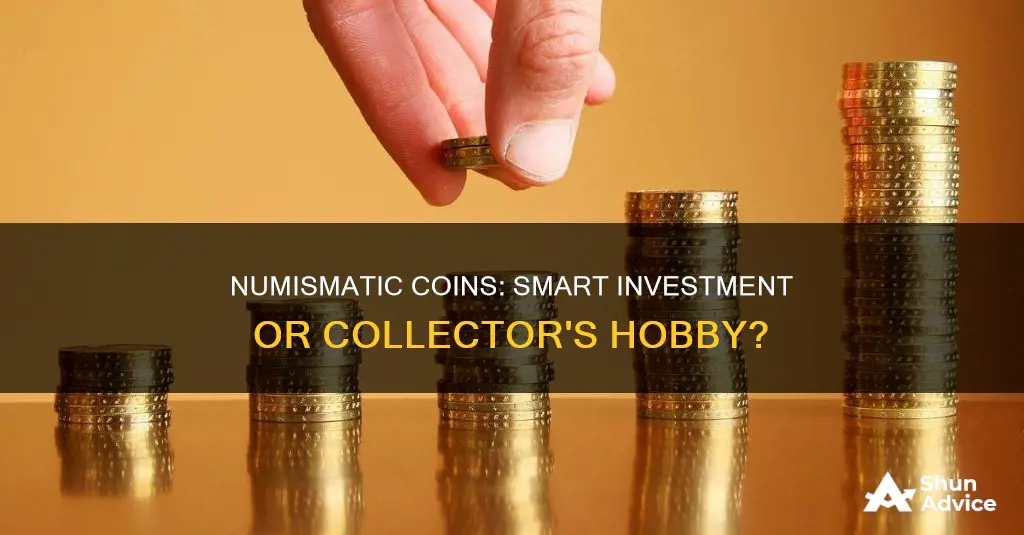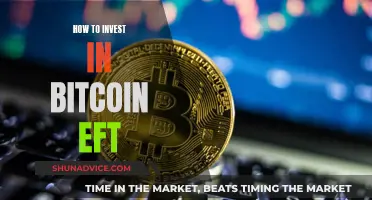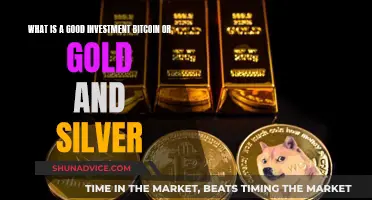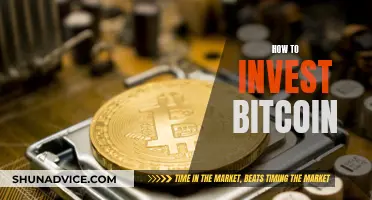
Numismatics is the study of coins and currencies, including paper money, tokens and other related valuables. Numismatic coins are no longer in production and are therefore in limited supply. They are valued for their rarity and historical significance, and their worth depends on factors such as age, condition, and mint. While some people invest in these coins, it is a complex, illiquid market with a steep learning curve. The value of a numismatic coin is largely subjective and based on intangible factors, so there is no guarantee of making a profit. For those looking to diversify their portfolios and make long-term investments, bullion coins are often a safer bet.
| Characteristics | Values |
|---|---|
| Intrinsic Value | The value of numismatic coins is based on their rarity and historical value, whereas bullion coins derive their value from the precious metal content. |
| Market Liquidity | The numismatic market is illiquid and complex, whereas the bullion market is liquid and straightforward. |
| Learning Curve | The numismatic market is challenging to navigate and requires extensive research, whereas the bullion market is easier to understand with a universal basis for valuation. |
| Volatility | The numismatic market is volatile and subject to fluctuations in demand and pricing, whereas the bullion market offers stable and reliable investments. |
| Investment Horizon | Numismatic coins are typically long-term investments, whereas bullion coins can provide short-term returns. |
| Inflation Hedge | Numismatic coins may offer some protection against inflation due to their tangible nature, but bullion coins are more effective as a hedge against inflation. |
| Diversification | Numismatic coins can add diversity to an investment portfolio, especially for collectors interested in the historical value. |
| Collectibility | Numismatic coins are sought-after by collectors due to their rarity and historical significance, whereas bullion coins are primarily valued for their metal content. |
| Sentimental Value | Numismatic coins may have sentimental value for collectors, whereas bullion coins are mostly valued for their intrinsic worth. |
What You'll Learn

The numismatic coin market is volatile
The numismatic market is also susceptible to economic conditions and can be compared to the stock market, with highs and lows in demand and pricing. For example, the market for numismatic coins boomed in the 1980s but crashed in 1989, and it struggled for several years until demand picked up again in 1995. Similarly, demand and prices dropped during the past two recessions when the prices of gold and silver took a hit. Therefore, investing in numismatic coins is not a quick way to make money but rather a long-term endeavour.
The value of numismatic coins is influenced by several factors, including the condition of the coin, with those in mint condition being more valuable. The survival rate of a coin also plays a role, as those with a low survival rate are rarer and thus more expensive. The mintage and production volume of a coin can also affect its worth. Additionally, the value of numismatic coins can be influenced by the value of the US dollar, large-scale purchasing by central banks, the production volume of precious metal mines, and current economic stability.
Overall, the numismatic coin market is volatile and subject to various factors that can influence the value of coins. It requires expertise and a long-term commitment to be a successful investment strategy.
If I Invested in Bitcoin: How Much Would I Have?
You may want to see also

Numismatic coins are subject to inflated prices
Numismatic coins are often much older and made of various metals and components, giving them a lower melt value than bullion coins. This means that they are worth less when melted than they are in coin form. The price of numismatic coins is usually much higher than their actual metal content, and buyers will have to pay a significant markup.
The value of numismatic coins is determined by their rarity and historical value, and this is largely subjective. The numismatic value of a rare coin is based on factors such as demand, market timing, coin condition, rarity, age, country of origin, and method of auctioning. These coins are often purchased by those who want to own a piece of history and pass them down through the generations.
The numismatic market is complex, illiquid, and challenging to navigate. It involves a steep learning curve, and the value of numismatic coins is subject to countless subjective variables. The market for these coins is tiny compared to bullion, and it can be difficult to find a willing buyer at a fair price. The numismatic market is also a playground for scam artists, with some sellers going to great lengths to overstate the value of what they are selling.
Numismatic coins are best suited for those who are truly passionate about the hobby of coin collecting and are willing to put in the time and effort to understand the intricacies of the market. It is not recommended as a short-term investment strategy, but rather as a long-term endeavour.
The Ultimate Guide to Investing in Bitcoin Cash
You may want to see also

Numismatic coins have poor liquidity
The value of a numismatic coin is largely subjective and based on factors such as demand for the coin, market timing, coin condition and rarity, age, country of origin, and method of auctioning. These factors make it challenging to determine the fair market value of a numismatic coin and can lead to significant variations in pricing. As a result, investors may struggle to find buyers or sellers who are willing to transact at their desired price point.
The poor liquidity of numismatic coins also stems from the specialised and complex nature of the market. The numismatic market requires a steep learning curve, and even experts in the field may disagree on the grading and value of a particular coin. This complexity can deter potential buyers and reduce the liquidity of numismatic coins.
Additionally, the numismatic market is prone to deceptive marketing and inflated prices. Unscrupulous dealers may overstate the value of coins or charge excessive premiums, increasing the risk of financial loss for investors. The highly specialised nature of the numismatic market makes it more challenging for investors to navigate and assess the fair value of coins, further contributing to the poor liquidity.
In contrast, bullion coins have higher liquidity due to their straightforward valuation based on the type and weight of the metal. Bullion is widely recognised and highly liquid, making it easier to resell at fair, universally recognised prices. The larger market for bullion provides more opportunities for buyers and sellers to transact, improving the liquidity compared to numismatic coins.
UK Guide: Getting Started with Bitcoin Investments
You may want to see also

Numismatic coins are a long-term investment
Numismatic coins are a good long-term investment for those who are passionate about the hobby and are willing to put in the time to understand the market.
Numismatic coins, or collectible coins, are no longer in production and have a limited supply, which can drive up their value. The value of these coins is based on their rarity, historical significance, and condition, rather than their melt-down value. This means that the market for numismatic coins is complex, illiquid, and challenging to navigate.
For example, the value of a numismatic coin is influenced by factors such as its age, rarity, year of issue, design, and the mint at which it was struck. The condition of the coin is also important, with uncirculated or mint-state coins being the most valuable.
Investing in numismatic coins requires a significant amount of research and expertise. It is important to understand the specific characteristics that influence the value of these coins and to be able to identify rare minting errors or desirable dates and mint marks, which can increase a coin's value. Additionally, it is crucial to deal only in certified coins that have been inspected and graded by a recognized organization to avoid being scammed or paying more than a coin's worth.
The numismatic coin market can be volatile, with demand and pricing fluctuating depending on economic conditions and other factors. Therefore, investing in these coins should be viewed as a long-term endeavour, with the understanding that there will be ups and downs in the market.
In summary, numismatic coins can be a good long-term investment, but it requires a significant amount of knowledge, passion, and patience to be successful.
Best Coinbase Investments: Where to Put Your Money
You may want to see also

Numismatic coins are collectibles
Numismatic coins are collectible coins that are no longer in production and, therefore, in limited supply. While the base value of these rare coins doesn't change, they have an additional value that exceeds their melt value. This additional value depends on their specific characteristics, age, and condition (such as mint-state).
The value of a collectible coin is determined by the physical metal in the coin (known as its 'bullion value') and its numismatic value. The bullion value is easily determined by assessing the quantity of gold, silver, palladium, or platinum in a collectible coin. Generally, this refers to the number of ounces stored in the coin. Multiply this by the actual spot price per ounce of the precious metal at any given time. This is the bullion value of your collectible coin.
Numismatic value is a slightly different factor when it comes to determining the worth of a collectible coin. Generally, this determination is applied to rare and antique coins and is based more on rarity and even the sentiment of the coin's owner. This determination is a bit more subjective and can vary as a result.
The condition of the coin is also taken into account. Uncirculated collectible coins often draw more interest and are thereby awarded a higher value. This isn't to say that circulated coins are not a good investment, but an investor should expect a lower return when it comes to coins that display or suggest usage.
Numismatic coins are much like stocks or any other asset. There are times when they're in high demand, especially during periods of strong economic performance and high inflation, while at other times, demand and pricing are weak. While we tend to think of stock markets overheating and subsequently popping, the same can happen, and has happened, in the rare coin market.
For beginners, collecting rare coins may seem daunting. Experts and experienced collectors offer this advice:
- Specialize your investment selection.
- Scrutinize each addition to your collection.
- Study to grow your expertise.
- Start with a small investment.
Litecoin Investment: How Much Should You Invest?
You may want to see also
Frequently asked questions
Numismatic coins are collectibles, so their worth depends on their rarity and historical value. Bullion coins, on the other hand, have a defined value based on their precious metal content.
The numismatic value of a rare coin is largely subjective, so there is no guarantee of profit when you sell. Numismatic coins also have poor liquidity, with a very small market compared to bullion coins.
Numismatic coins can be a great way to diversify your portfolio and reduce risk. They are also a way to own a piece of history and can be a fun hobby.







